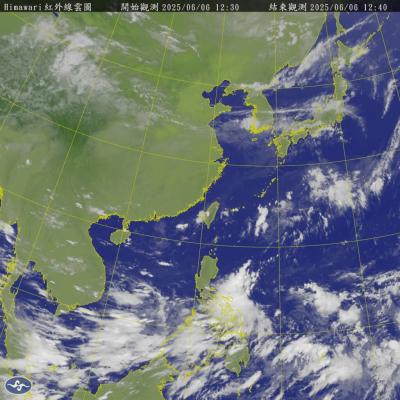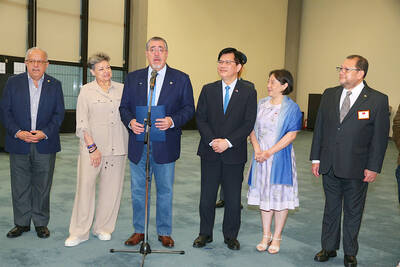The Bush administration is furious over Chinese assertions that Taiwan's delegation was not invited to the official ceremonies marking the second inauguration of President George W. Bush, and has pointedly refuted what it considers to be Beijing's deliberate misrepresentation of Washington's private statements to it on the matter.
Taiwan's delegation, headed by Academia Sinica President Lee Yuan-tseh (李遠哲), was clearly invited by the inauguration committee to this week's gala inauguration events, a senior administration official told the Taipei Times, speaking on condition of anonymity.
"The Taiwan people are represented in the same manner as they were in the 2001 inauguration, and the administration is very pleased that the people of Taiwan are represented in a celebration of democracy," the official said.
Welcomed
"We were informed that the delegation would come and that Dr. Lee would lead it, and we welcome that," the official said.
"We look forward to the opportunity to interact," with Lee and the delegation, the official added.
The official accused Beijing of trying to create the false impression that Taiwan's status was being downgraded by the Bush administration.
"It's actually quite the contrary," he said.
The administration took umbrage at a statement by the Chinese foreign ministry that Beijing "was clearly told that the US did not invite or recognize the so-called envoy delegation sent by Taiwan."
China "has expressed concerns over this to the US," the statement added.
What actually transpired in closed-door meetings after the Chinese embassy complained about the Taiwanese delegation to the State Department, was that the US side said that "technically" no government has been invited, government sources say.
Only the Washington diplomatic corps was invited.
Those diplomats, of course, could invite anybody they wanted to join them.
`Distorted'
The Chinese distorted this response to mean that Taiwan was not represented, and said as much in its public statement, US officials told the Taipei Times.
In response to the statement from China's ministry, a senior US official said that, "Dr Lee is a world-renowned scientist and has represented the people of Taiwan at four APEC summits, and is well know in the United States. We were well aware that he was coming, and welcome his visit."
"It is important for people to understand that this is at the same level as in the past," the official reiterated.
The US official also disclosed that the Taiwanese delegation, whose leading official is Mainland Affairs Council Chairman Joseph Wu (吳釗燮), will "have an opportunity for unofficial discussions on matters of mutual concern with relevant officials and members of Congress."
In the past, the US has refused to acknowledge the existence of such talks.
The reference to 2001 is significant in that Bush came into office as an unabashed supporter of Taiwan, against China, which was called a "competitor," in his election campaign. That policy was reinforced in April 2001, when Bush told a television interviewer that his administration would do "whatever it took" to help defend Taiwan, and agreed to an unprecedented multi-billion dollar arms package.
Referendum slap
But by late 2003 that policy had undergone a dramatic about-face, when Bush publicly issued a personal slap at President Chen Shui-bian's (
The White House has continued to seek better relations with China as a partner in the war on terrorism and for Beijing's aid in advancing talks to convince North Korea to end its nuclear weapons development program.
Anti-secession Law
More recently, the Bush administration's failure to publicly criticize Beijing planned anti-secession law -- that could mandate a military attack on Taiwan if it moves toward independence -- plus comments by Secretary of State Colin Powell and his deputy Richard Armitage, might also have emboldened China to feel Washington was ready to move closer to accepting Beijing's positions on Taiwan.
In recent weeks, Powell has mentioned US acceptance of Taiwan "reunification" with China, and Armitage has said Washington agrees that Taiwan is part of China.
Both statements went to the core of Beijing's "one China" principle. US officials had earlier distanced themselves from that principle.

Greenpeace yesterday said that it is to appeal a decision last month by the Taipei High Administrative Court to dismiss its 2021 lawsuit against the Ministry of Economic Affairs over “loose” regulations governing major corporate electricity consumers. The climate-related lawsuit — the first of its kind in Taiwan — sought to require the government to enforce higher green energy thresholds on major corporations to reduce emissions in light of climate change and an uptick in extreme weather. The suit, filed by Greenpeace East Asia, the Environmental Jurists Association and four individual plaintiffs, was dismissed on May 8 following four years of litigation. The

STAY AWAY: An official said people should avoid disturbing snakes, as most do not actively attack humans, but would react defensively if threatened Taitung County authorities yesterday urged the public to stay vigilant and avoid disturbing snakes in the wild, following five reported snakebite cases in the county so far this year. Taitung County Fire Department secretary Lin Chien-cheng (林建誠) said two of the cases were in Donghe Township (東河) and involved the Taiwan habus, one person was bit by a Chinese pit viper near the South Link Railway and the remaining two were caused by unidentified snakes. He advised residents near fields to be cautious of snakes hiding in shady indoor areas, especially when entering or leaving their homes at night. In case of a

A tropical disturbance off the southeastern coast of the Philippines might become the first typhoon of the western Pacific typhoon season, the Central Weather Administration (CWA) said. The system lacks a visible center and how it would develop is only likely to become clear on Sunday or Monday, the CWA said, adding that it was not yet possible to forecast the potential typhoon's effect on Taiwan. The American Meteorological Society defines a tropical disturbance as a system made up of showers and thunderstorms that lasts for at least 24 hours and does not have closed wind circulation.

DIPLOMACY: It is Guatemalan President Bernardo Arevalo’s first visit to Taiwan since he took office last year, while Eswatini’s foreign minister is also paying a visit A delegation led by Guatemalan President Bernardo Arevalo arrived in Taiwan yesterday afternoon and is to visit President William Lai (賴清德) today. The delegation arrived at Taiwan Taoyuan International Airport at 4:55pm, and was greeted by Minister of Foreign Affairs Lin Chia-lung (林佳龍). It is Arevalo’s first trip to Taiwan since he took office last year, and following the visit, he is to travel to Japan to celebrate the 90th anniversary of diplomatic relations between the two countries. Arevalo said at the airport that he is very glad to make the visit to Taiwan, adding that he brings an important message of responsibility